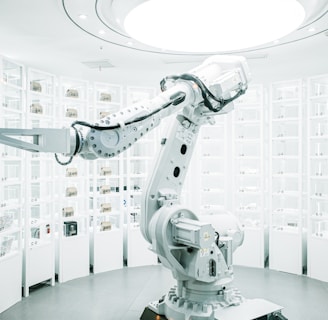Unlocking Efficiency: The Role of AI in Modern Manufacturing


In today's fast-paced manufacturing landscape, efficiency is paramount. Manufacturers are constantly seeking ways to optimize processes, reduce costs, and increase productivity to stay competitive. One technology that has emerged as a game-changer in this regard is Artificial Intelligence (AI). In this blog post, we'll explore how AI is revolutionizing modern manufacturing and driving efficiency across the board.
Harnessing Data for Insights
At the heart of AI-powered manufacturing is data. With the proliferation of sensors, IoT devices, and connected machinery, manufacturers have access to vast amounts of data about their operations. AI algorithms can analyze this data in real-time, uncovering patterns, trends, and insights that human analysts may overlook. By harnessing the power of data, manufacturers can make more informed decisions, optimize processes, and drive continuous improvement.
Predictive Maintenance
One of the most impactful applications of AI in manufacturing is predictive maintenance. Traditional maintenance practices are often reactive, leading to costly downtime and disruptions. AI-powered predictive maintenance, on the other hand, uses machine learning algorithms to analyze equipment data and predict when maintenance is needed before a breakdown occurs. By proactively addressing issues, manufacturers can minimize downtime, extend equipment lifespan, and reduce maintenance costs.
Optimizing Production Processes
AI is also transforming production processes, enabling manufacturers to optimize efficiency and throughput. AI algorithms can optimize production schedules, minimize changeover times, and maximize equipment utilization to ensure that production lines run smoothly and efficiently. By fine-tuning processes in this way, manufacturers can reduce waste, improve quality, and meet customer demand more effectively.
Quality Control and Inspection
Ensuring product quality is essential for maintaining customer satisfaction and brand reputation. AI-powered quality control systems use computer vision and machine learning algorithms to inspect products for defects and anomalies. These systems can detect imperfections with a level of accuracy and consistency that surpasses human capabilities, reducing the likelihood of defective products reaching the market and minimizing costly recalls.
Empowering the Workforce
Contrary to popular belief, AI is not about replacing human workers—it's about augmenting their capabilities. By automating repetitive tasks and providing real-time insights, AI frees up human workers to focus on more value-added activities, such as problem-solving, creativity, and innovation. This not only enhances job satisfaction but also enables manufacturers to tap into the full potential of their workforce.
Embracing the Future with AI
In conclusion, AI is reshaping the manufacturing industry in profound ways, driving efficiency, productivity, and innovation. By harnessing the power of AI, manufacturers can unlock new opportunities for growth and competitiveness in an increasingly digital world. At 5K Innovations, we're committed to helping manufacturers harness the full potential of AI to optimize their operations and thrive in the digital age. Contact us today to learn more about how AI can transform your manufacturing processes and propel your business forward.
